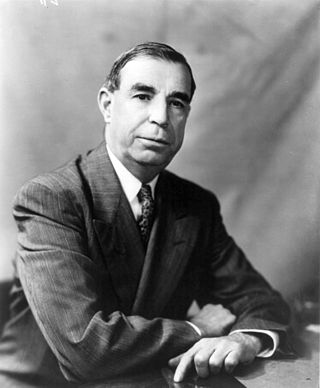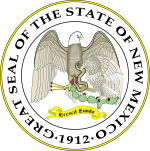
Gary Earl Johnson is an American businessman and politician who served as the 29th governor of New Mexico from 1995 to 2003 as a member of the Republican Party. He has been a member of the Libertarian Party since 2011 and was the party's nominee for President of the United States in the 2012 and 2016 elections. He was also the Libertarian nominee in the 2018 U.S. Senate election in New Mexico.

Charles Bradford Henry is an American lawyer and politician who served as the 26th governor of Oklahoma from 2003 to 2011. A Democrat, he previously served in the Oklahoma Senate from 1992 to 2003.

Martin Joseph "Marty" Chávez is an American politician, businessman, and attorney who served as a member of the New Mexico Senate from 1987 to 1993 and as the 26th and 28th mayor of Albuquerque, New Mexico. He served as the Executive Director of ICLEI Local Governments for Sustainability USA. and Chairman of the Advisory Board for the Center for Green Schools at U.S. Green Building Council. In 2012, he unsuccessfully sought the Democratic nomination for the Congressional seat being vacated by Martin Heinrich, who retired from the House to run for Senate.

Dionisio "Dennis" Chávez was an American politician who served in the United States House of Representatives from 1931 to 1935, and in the United States Senate from 1935 to 1962. He was the first Hispanic to be elected to a full term in the US Senate and the first US Senator to be born in New Mexico, which was still a US territory at the time of his birth.

The 1986 United States Senate elections were elections for the United States Senate. Held on November 4, in the middle of Ronald Reagan's second presidential term, the 34 seats of Class 3 were contested in regular elections. The Republicans had to defend an unusually large number of freshman Senate incumbents who had been elected on President Ronald Reagan's coattails in 1980. Democrats won a net of eight seats, defeating seven freshman incumbents, picking up two Republican-held open seats, and regaining control of the Senate for the first time since January 1981. This remains the most recent midterm election cycle in which the sitting president's party suffered net losses while still flipping a Senate seat.

The 1964 United States Senate elections were held on November 3. The 33 seats of Class 1 were contested in regular elections. Special elections were also held to fill vacancies. They coincided with the election of President Lyndon B. Johnson by an overwhelming majority, to a full term. His Democratic Party picked up a net two seats from the Republicans. As of 2023, this was the last time either party has had a two-thirds majority in the Senate, which allowed the Senate Democrats to override a veto, propose constitutional amendments, or convict and expel certain officials without any votes from Senate Republicans. However, internal divisions would have prevented the Democrats from having done so. The Senate election cycle coincided with Democratic gains in the House in the same year.

The 1960 United States Senate elections coincided with the election of John F. Kennedy as president on November 8, 1960. The 33 seats of Class 2 were contested in regular elections. A special election was also held on June 28, 1960, for a mid-term vacancy in North Dakota where Democrats flipped a seat to expand their majority to 66–34. As Majority Leader Lyndon Johnson was elected Vice President, Mike Mansfield became the new majority leader.

Robert Blackwell Docking was an American businessman and politician from Kansas who served as the 38th governor of Kansas from 1967 until 1975. A conservative Democrat in a heavily Republican state, Docking is to date Kansas's only governor to serve four terms.

The Kansas Republican Party is the state affiliate political party in Kansas of the United States Republican Party. The Kansas Republican Party was organized in May 1859.

United States gubernatorial elections were held on November 5, 2002, in 36 states and two territories. The Republicans won eight seats previously held by the Democrats, as well as the seat previously held by Minnesota governor Jesse Ventura, who was elected on the Reform Party ticket but had since renounced his party affiliation. The Democrats won 10 seats previously held by the Republicans, as well as the seat previously held by Maine governor Angus King, an independent. The elections were held concurrently with the other United States elections of 2002.

United States gubernatorial elections were held on November 3, 1998, in 36 states and two territories. Going into the election cycle, 24 of the seats were held by Republicans, 11 by Democrats, and one by an Independent. The elections changed the national balance of power by the loss of one Republican and the gain of one Independent, although political party dominance was shifted in nine states. Democrats gained open seats in California and Iowa and defeated incumbents Fob James of Alabama and David Beasley of South Carolina, while Republicans won open seats in Colorado, Florida, Nebraska, and Nevada and the Reform Party won an open Republican governorship in Minnesota. By the end of the election, 23 seats were held by Republicans, 11 by Democrats, one by the Reform Party, and one by an Independent.

The Republican Party of New Mexico is the affiliate of the United States Republican Party in New Mexico. It is headquartered in Albuquerque and led by chairperson Steve Pearce, vice chair Frank Trambley, secretary Mari Trujillo Spinelli, and treasurer David Chavez.

The 2008 Wisconsin fall general election was held on November 4, 2008. All of Wisconsin's eight seats in the United States House of Representatives were up for election. Within the state government, sixteen seats in the Wisconsin State Senate, and all 99 seats in the Wisconsin State Assembly were up for election. At the presidential level, voters chose ten electors to represent them in the Electoral College, which then helped select the president of the United States. The 2008 fall partisan primary was held on September 9, 2008.

The 1994 New Mexico gubernatorial election was held on November 8, 1994, for the four-year term beginning on January 1, 1995. Candidates for governor and lieutenant governor ran on a ticket as running mates.

A general election was held in the U.S. state of New Mexico on November 4, 2014. All of New Mexico's executive officers were up for election as well as a United States Senate seat, and all of New Mexico's three seats in the United States House of Representatives. Primary elections were held on June 3, 2014.

A general election was held in the U.S. state of New Mexico on November 6, 2018. All of New Mexico's executive officers were up for election as well as a United States Senate seat, and all of New Mexico's three seats in the United States House of Representatives.

United States gubernatorial elections were held on November 8, 2022, in 36 states and three territories. As most governors serve four-year terms, the last regular gubernatorial elections for all but two of the seats took place in the 2018 U.S. gubernatorial elections. The gubernatorial elections took place concurrently with several other federal, state, and local elections, as part of the 2022 midterm elections.

The 2022 United States House of Representatives elections in New Mexico were held on November 8, 2022, to elect the three U.S. representatives from the state of New Mexico, one from each of the state's three congressional districts. The elections coincided with the New Mexico gubernatorial election and various state and local elections. The Democratic party gained the 2nd Congressional seat, gaining unitary control of New Mexico's Congressional delegation for the first time since 2018 and improving the advantage in the House delegation for New Mexico from 2–1 in favor of Democrats to 3–0.

The 2019 Louisiana State Senate election was held on October 12, 2019, with runoff elections held on November 16, 2019. All 39 seats in the Louisiana State Senate were up for election to four-year terms. Under the Louisiana primary system, all candidates appeared on the same ballot, regardless of party. Five districts held runoff elections due to no candidate receiving a majority of the vote in the general election.

Following statewide primaries held on March 5, 2024, the 2024 Texas House of Representatives election will be held on November 5, 2024. The winners of this election will serve in the 89th Texas Legislature. It will be held alongside numerous other federal, state, and local elections, including the 2024 U.S. presidential election and the 2024 Texas Senate election.























